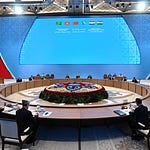In this episode of the CAPS Unlock podcast, hosts Peter Leonard and Tlegen Kuandykov unpack two fascinating geopolitical developments in Central Asia: a (very) long-negotiated border agreement between Kyrgyzstan and Tajikistan and Uzbekistan’s deepening railway ties with Afghanistan.
The episode opens with an in-depth discussion on the Kyrgyz-Tajik border deal, a historic agreement that could finally resolve decades of disputes in the Fergana Valley. We explore what led to this breakthrough, how the agreement balances land exchanges, and the political dynamics shaping its ratification. While optimism is warranted, concerns remain about whether local communities’ interests will be considered and whether Kyrgyzstan’s increasingly authoritarian government will allow open debate on the deal.
In this week’s interview, we speak with Kuanysh Tastanbekova, a native of Kazakhstan and a scholar at Japan’s University of Tsukuba, to discuss how climate change education is taught in Japan and what lessons Kazakhstan can learn. From hands-on environmental awareness to fostering a culture of mindful consumption, Tastanbekova highlights why Kazakhstan’s education system needs to better connect theory to real-world issues like waste management and water conservation.
The conversation then shifts to Afghanistan’s growing role in Central Asian connectivity. Uzbekistan recently signed a deal with the Taliban-led regime to extend a railway line from Hairatan to Herat, a move that could link Central Asia more directly with the Persian Gulf. We look at how this fits into broader ambitions to integrate Central Asia into South Asian trade networks, reducing dependency on Russia and China. However, logistical and soft infrastructure challenges – such as customs procedures and political stability in Afghanistan – could slow progress.














Share this post